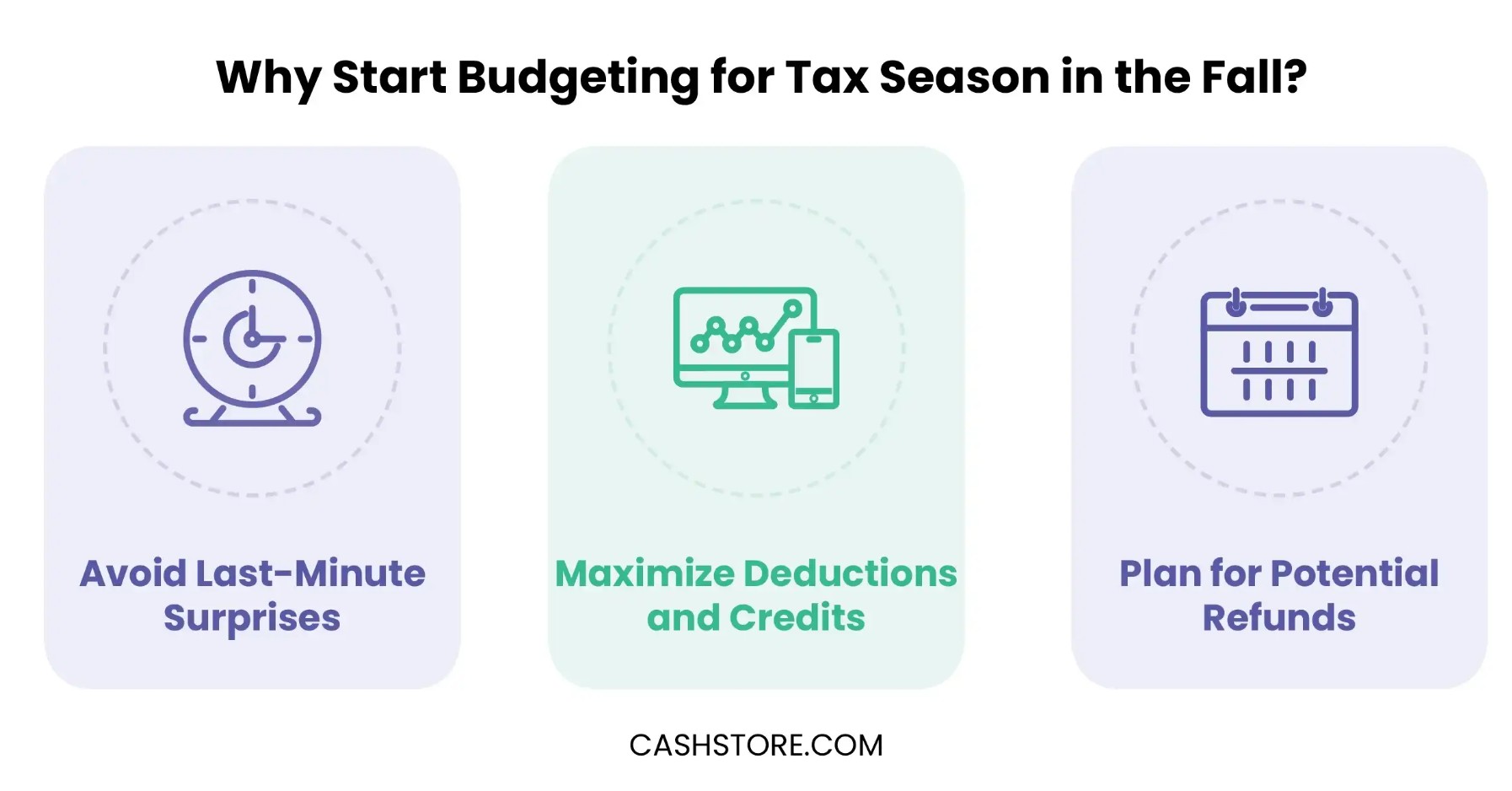Cash Store Blog
Budgeting for Tax Season—What Should You Do Now?
If there is one thing we can rely on year over year, it’s that tax season will come. And what great timing, right? Just as we wrap up the holidays and celebratory season, we need to start getting all of our financial paperwork in order, crossing our fingers that we won’t owe a hefty sum to the Internal Revenue Service (IRS) or the state government.
Yet, as predictable as tax season is, it sneaks up on us every year. Perhaps it's that hustle and bustle of the holidays, or maybe it's because we’re hunkering down for the winter. Whatever it is, before we know it, it’s time to start preparing for our tax returns.
In this article, the team at Cash Store will share a few pointers on tax season budgeting so you can keep that tax surprise from catching up with you each year. Why? Because with some planning and budgeting in the fall and winter, the tax season can be so much easier.

Why Start Budgeting for Tax Season in the Fall?
We don’t know anyone who looks forward to tax time. But while about 75% of tax filers expect a refund, that remaining 25% is not only concerned about how much they’ll have to pay in but whether or not the entire process will put them into debt.
Whether you are expecting to get some money back, break even, or pay in, taking time to budget for all scenarios is a good thing to do. And the fall is a good time to do it. Not only can the process help you keep your holiday spending in check, but it can help with the following:
- Avoid Last-Minute Surprises: Starting early allows you to organize your finances and prevent any unexpected bills or penalties when tax time arrives.
- Maximize Deductions and Credits: Preparing ahead gives you the chance to gather receipts and important documents, making it easier to take advantage of all the deductions and credits available to you.
- Plan for Potential Refunds: By budgeting now, you can decide how best to use any potential refund, whether for savings or paying down debt.

Start by Reviewing Your Current Financial Situation
So, just how do you budget for your taxes? Great question. It all starts with reviewing and reassessing your financial situation. And one of the tools you will need at your disposal is your family budget. Review it closely to make sure that you are still living within your means and that your spending for your wants, needs, and savings is still within balance.
With your budget in hand, take the following steps:
- Update Income and Expenses: Review any recent changes in income, employment, or major life events that could affect your tax situation.
- Calculate Expected Tax Liability: Use an online tax estimator to get a sense of whether you might owe money or expect a refund.
- Adjust Withholdings: Check your W-4 form and make adjustments if necessary to better align with your current financial picture. If you don’t know how to adjust your withholdings, check with your human resources representative who can help you access the tax information on file with your employer.

Set Up a Specific Tax Season Savings Account
We talk about the importance of setting up an emergency fund and making sure you are setting money aside for your retirement. But those accounts serve very specific purposes, and ideally, you want to avoid tapping into them to cover your taxes. Instead, we suggest that in the late summer or fall—if you haven’t done this already—you set up a specific savings account where you can put some money aside with each paycheck to cover a potential amount due.
Here are some quick tips to help this process be as successful as possible.
- Open a Designated Savings Account: Create a dedicated account to set aside funds to cover any tax-related expenses.
- Automatic Transfers: Set up recurring transfers from your paycheck into this account to steadily build your tax savings.
- Savings Goal: Set aside a specific percentage of your income each month (such as 10%) to prepare for any tax obligations.
Common Mistakes to Avoid When Tax Planning
It’s important to know that mistakes do happen. Perhaps you didn’t set aside enough money for tax season budgeting. Perhaps your withholdings are out of whack. But, with proper planning, working with a qualified accountant, and some diligence, you’ll be setting yourself up for success rather than failure.
That said, it’s important to understand the common mistakes that taxpayers make when planning for the tax season.
- Ignoring Changes in Tax Law: Stay informed about any recent tax law changes that could impact your filing.
- Not Accounting for Side Hustle Income: Make sure you track all income from gig work or freelance jobs throughout the year.
- Overlooking Potential Deductions: Pay attention to smaller deductions, like education credits or home office expenses, which can add up and reduce your tax liability.
Need Help Covering Some Unexpected Expenses?
Though following the tax season budgeting tips provided to you in this article can help you avoid being caught off guard when tax day comes, we know that sometimes, despite our best efforts, we come up short. Whether we don’t have enough money to cover our taxes owed or an unexpected expense that comes up along the way, these things can be frustrating. And when our credit score isn’t quite up to muster, we may wonder how we’ll get the cash to keep us on the up and up.
This is where Cash Store can help. We offer installment loans that are designed to offer you assistance when you need it most. Want to learn more? Complete our prequalification application today.


